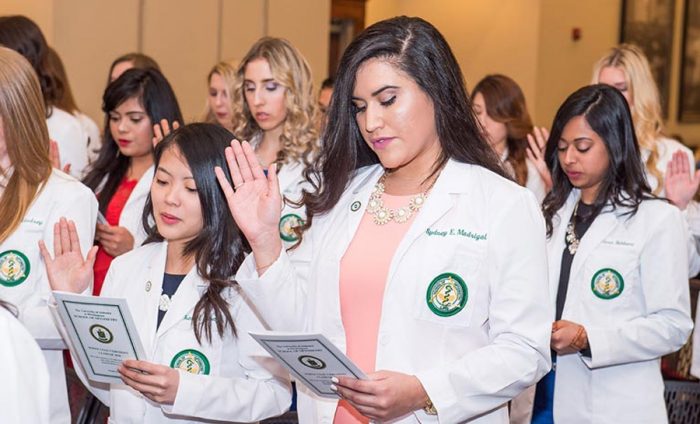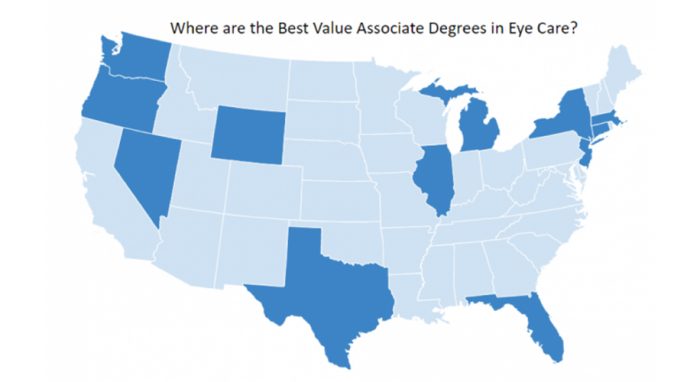Best Value Schools for a Degree in Eye Care
 Image source: University of Alabama at Birmingham
Image source: University of Alabama at Birmingham
With eye care jobs on the rise, now is a great time to begin a career in the vision industry. According to the U.S. Bureau of Labor Statistics (BLS), national job growth on average is 5%. Optician jobs are growing by 7% and the outlook for optometrists is doubling, so students can be confident that there won’t be a shortage of jobs in the future.
However, with tuition rates rising and higher education more expensive than ever, pursuing a doctorate may not be the best option for you. Luckily, not all eye care careers are costly in terms of length and tuition. We explored different career paths and degree options to find the best choices for schooling.
Choosing the Best Value School
When pursuing an education to prepare you for a career in eye care, there are a number of options. Certain schools offer associate degrees to become an optician or ophthalmic technician, while others offer degrees in vision science and pre-medical degrees that prepare students for a successful path into optometry or ophthalmology.
We used BLS, the Integrated Postsecondary Education Data System (IPEDS), and College Scorecard databases to compile information on the best schools. We then used the following metrics to create a list of the colleges and universities that award degrees in eye care related topics:
- Tuition costs
- BLS median salary per state in relevant job roles
- Average earnings 6 years post enrollment per school
- Average earnings 10 years post enrollment per school
 Image source: American Optometric Association
Image source: American Optometric Association
Best Value Schools For Associate’s Degree

We compiled a list of the top 20 schools that give students the best value in pursuing an eye care career path as an optician or ophthalmic technician through an associate’s degree.
- San Jacinto Community College – Texas
- Broward College – Florida
- Casper College – Wyoming
- Renton Technical College – Washington
- Benjamin Franklin Institute of Technology – Massachusetts
- Indiana University – Indiana
- Raritan Valley Community College – New Jersey
- College of Southern Nevada – Nevada
- Florida State College at Jacksonville – Florida
- Camden County College – New Jersey
- Hillsborough Community College – Florida
- Portland Community College – Oregon
- Northwest College – Wyoming
- Triton College – Illinois
- CUNY New York City College of Technology – New York
- Henry Ford College – Michigan
- Middlesex Community College – Connecticut
- Palm Beach State College – Florida
- Erie Community College – New York
- Goodwin College – Connecticut
Comparison of Best Value Schools for Associate’s Degree in Eye Care
Read on to learn more about the top 20 schools offering associate’s degrees in an eye care field and what makes them unique, as well as good options regarding best value for money.

San Jacinto Community College ends up ranking first for both in-state and out-of-state prospective students. Based near Houston, students can benefit from low tuition and high expected earnings post graduating with an AAS in Eye Care Technology. The accredited program prepares students by connecting the classroom with laboratory training and external clinical instruction at leading ophthalmic clinics.
 Broward College is a large public college based in the Miami area with a 100% acceptance rate. They end up ranking second for in-state and out-of-state students and successful graduates can expect to have their AAS in Vision Care in as little as 18 months after enrollment. The curriculum trains students in laboratory techniques and preliminary examination.
Broward College is a large public college based in the Miami area with a 100% acceptance rate. They end up ranking second for in-state and out-of-state students and successful graduates can expect to have their AAS in Vision Care in as little as 18 months after enrollment. The curriculum trains students in laboratory techniques and preliminary examination.
 Casper College is a small public college offering students an associate-level pre-optometry program that includes the fundamental coursework to transfer to a four-year institution. Students will gain insight into eye care careers and be prepared to sit the ABO-NCLE exam. Although Wyoming doesn’t require opticians to be licensed, requirements will be set by employers and well-prepared graduates will have a competitive edge.
Casper College is a small public college offering students an associate-level pre-optometry program that includes the fundamental coursework to transfer to a four-year institution. Students will gain insight into eye care careers and be prepared to sit the ABO-NCLE exam. Although Wyoming doesn’t require opticians to be licensed, requirements will be set by employers and well-prepared graduates will have a competitive edge.
 RTC is a small public college in the Seattle area with a 100% acceptance rate. Renton Tech offers students a comprehensive ophthalmic assistant program that combines classroom lectures with laboratory experience so students can feel well-prepared to sit the national certification exam for ophthalmic assistants post-graduation.
RTC is a small public college in the Seattle area with a 100% acceptance rate. Renton Tech offers students a comprehensive ophthalmic assistant program that combines classroom lectures with laboratory experience so students can feel well-prepared to sit the national certification exam for ophthalmic assistants post-graduation.
 Benjamin Franklin Institute of Technology offers a competitive opticianry program and the school boasts a 95% job placement rate for graduates in the eye care field. It’s the only college in Massachusetts offering an opticianry program and opticians in MA earn 20% more than the national average optician wage.
Benjamin Franklin Institute of Technology offers a competitive opticianry program and the school boasts a 95% job placement rate for graduates in the eye care field. It’s the only college in Massachusetts offering an opticianry program and opticians in MA earn 20% more than the national average optician wage.
 Indiana University’s School of Optometry offers students the opportunity to receive an associate’s degree in optometric technology and opticianry. Successfully completing the program gives students an excellent entry point into the eye care field, and students can also choose to complete a bachelor’s degree and apply to complete their Doctor of Optometry at the same institution.
Indiana University’s School of Optometry offers students the opportunity to receive an associate’s degree in optometric technology and opticianry. Successfully completing the program gives students an excellent entry point into the eye care field, and students can also choose to complete a bachelor’s degree and apply to complete their Doctor of Optometry at the same institution.
 Raritan Val’s ophthalmic science program prepares students for a career in a complex field by combining a curriculum of anatomy, optics, business, and laboratory work. Raritan Valley has a vibrant campus in New Jersey and has been nationally recognized for its innovative learning and diversity initiatives.
Raritan Val’s ophthalmic science program prepares students for a career in a complex field by combining a curriculum of anatomy, optics, business, and laboratory work. Raritan Valley has a vibrant campus in New Jersey and has been nationally recognized for its innovative learning and diversity initiatives.
 Students choosing to attend CSN will receive real life training through the ophthalmic technology technician program and be prepared for the ABO-NCLE exam. Although the program is limited entry, students will also receive three skills certificates upon completion.
Students choosing to attend CSN will receive real life training through the ophthalmic technology technician program and be prepared for the ABO-NCLE exam. Although the program is limited entry, students will also receive three skills certificates upon completion.
 FSC at Jacksonville is a mid-size public college offering a range of degrees. The institution offers an ophthalmic technician associate in science degree that gives students a well-rounded experience with both education and technical courses, as well as experience in local clinics.
FSC at Jacksonville is a mid-size public college offering a range of degrees. The institution offers an ophthalmic technician associate in science degree that gives students a well-rounded experience with both education and technical courses, as well as experience in local clinics.
 Camden County College is a mid-size school based in New Jersey and is near Philadelphia. They offer an associate’s degree in ophthalmic science technology that blends practical lab experience with lectures to prepare students for a competitive career.
Camden County College is a mid-size school based in New Jersey and is near Philadelphia. They offer an associate’s degree in ophthalmic science technology that blends practical lab experience with lectures to prepare students for a competitive career.
 Students wanting to pursue an optical management technology degree can apply to Hillsborough Community College, a diverse school in Tampa with a long track record of helping students advance in their chosen career and prepare to pursue further education qualifications.
Students wanting to pursue an optical management technology degree can apply to Hillsborough Community College, a diverse school in Tampa with a long track record of helping students advance in their chosen career and prepare to pursue further education qualifications.
 Portland Community College is a large public college that offers two eye care associate degrees in opticianry or ophthalmic medical technology. The limited entry programs give candidates a competitive edge, with 100% of students passing the certified ophthalmic technician exam post-graduation. PCC boasts a high placement rate for students within a mere three months of graduation and they have a 20-year history of success.
Portland Community College is a large public college that offers two eye care associate degrees in opticianry or ophthalmic medical technology. The limited entry programs give candidates a competitive edge, with 100% of students passing the certified ophthalmic technician exam post-graduation. PCC boasts a high placement rate for students within a mere three months of graduation and they have a 20-year history of success.
 Students that may be looking to pursue a further career in the eye care industry can begin with an associate’s degree in pre-optometry at Northwest College. The courses required will be parallel for those found at four-year institutions for easy transfers if students decide to pursue further education. Northwest is a small public college with a 100% acceptance rate.
Students that may be looking to pursue a further career in the eye care industry can begin with an associate’s degree in pre-optometry at Northwest College. The courses required will be parallel for those found at four-year institutions for easy transfers if students decide to pursue further education. Northwest is a small public college with a 100% acceptance rate.
 Triton College offers an accredited ophthalmic technician program for students looking to pursue an associate’s degree in an eye care field. Students can benefit from small class sizes, knowledgeable faculty and hands-on laboratory experience to give them a competitive edge post-graduation.
Triton College offers an accredited ophthalmic technician program for students looking to pursue an associate’s degree in an eye care field. Students can benefit from small class sizes, knowledgeable faculty and hands-on laboratory experience to give them a competitive edge post-graduation.
 City Tech’s ophthalmic dispensing associate’s degree prepares graduates for the New York State licensing examination and a career in vision care. The curriculum combines a challenging coursework with laboratory experience to prepare students for real-life challenges in the eye care field.
City Tech’s ophthalmic dispensing associate’s degree prepares graduates for the New York State licensing examination and a career in vision care. The curriculum combines a challenging coursework with laboratory experience to prepare students for real-life challenges in the eye care field.
 Henry Ford College offers the only accredited ophthalmic technician program in Michigan. The program gives students a solid foundation of skills and knowledge to succeed in passing the certified ophthalmic technician exam post-graduation with hands-on learning and wonderful faculty.
Henry Ford College offers the only accredited ophthalmic technician program in Michigan. The program gives students a solid foundation of skills and knowledge to succeed in passing the certified ophthalmic technician exam post-graduation with hands-on learning and wonderful faculty.
 Middlesex Community College offers students a unique eye care degree through their ophthalmic design and dispensing program. The program gives students interested in becoming opticians a competitive advantage with a 100% pass rate for students taking the ABO-NCLE exam.
Middlesex Community College offers students a unique eye care degree through their ophthalmic design and dispensing program. The program gives students interested in becoming opticians a competitive advantage with a 100% pass rate for students taking the ABO-NCLE exam.
 Palm Beach State’s ophthalmic medical technology associate’s degree is offered to students along with a newly constructed educational center complete with a state-of-the-art ophthalmic examination room. Students will benefit from learning on the newest technology, giving them a competitive edge upon graduation.
Palm Beach State’s ophthalmic medical technology associate’s degree is offered to students along with a newly constructed educational center complete with a state-of-the-art ophthalmic examination room. Students will benefit from learning on the newest technology, giving them a competitive edge upon graduation.
 Erie Community College offers students an associate’s degree in ophthalmic dispensing. The curriculum will prepare graduates to make frame and lens type recommendations, detect prescription irregularities, and perform basic ophthalmic procedures. Students will be well prepared to take ABO-NCLE exams and any state licensing exams before joining the workforce.
Erie Community College offers students an associate’s degree in ophthalmic dispensing. The curriculum will prepare graduates to make frame and lens type recommendations, detect prescription irregularities, and perform basic ophthalmic procedures. Students will be well prepared to take ABO-NCLE exams and any state licensing exams before joining the workforce.
 Students at Goodwin College can benefit from small class sizes while pursuing a degree in vision care technology. The school boasts state-of-the-art training and laboratories and a 100% job placement rate post-graduation, making Goodwin a good option for students entering a competitive industry.
Students at Goodwin College can benefit from small class sizes while pursuing a degree in vision care technology. The school boasts state-of-the-art training and laboratories and a 100% job placement rate post-graduation, making Goodwin a good option for students entering a competitive industry.
Keep in mind that an associate’s degree doesn’t automatically grant individuals the ability to work as an optician or ophthalmic technician. Some states require graduates to take a certification exam before they begin employment. The American Board of Opticianry and National Contact Lens Examiners are a great resource to find further information for state requirements.
Top Best Value Schools for Optometrists
We looked at the doctor of optometry (O.D) programs offered in the U.S. and ranked the top ten best value schools for students using the above criteria.
- University of California-Berkeley
- Southern College of Optometry
- Western University of Health Sciences
- Midwestern University-Glendale Arizona College of Optometry
- New England College of Optometry
- University of Alabama at Birmingham – Alabama
- Ferris State University
- MCPHS University
- SUNY College of Optometry
- Midwestern University-Downers Grove
Since O.D. criteria require students to have a bachelor’s degree, many schools offer a pre-optometry undergraduate program to fast track eligible graduates into a doctorate. Although there are few schools offering optometry programs, most schools offer a pre-med or science degree for any students that haven’t fully committed to pursuing a degree in the eye care field.


 United States
United States